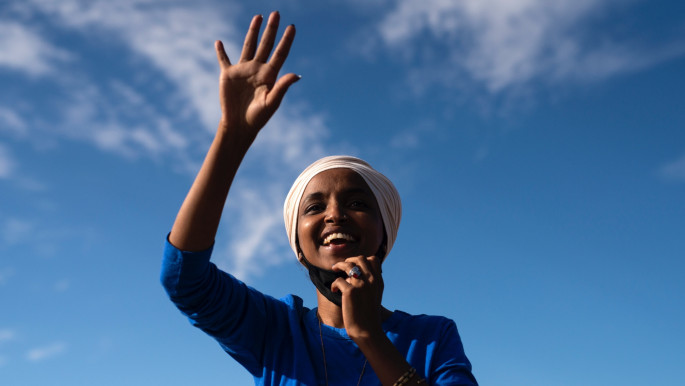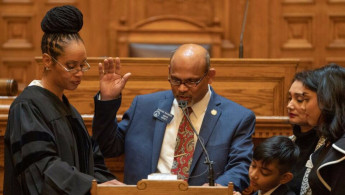Meet Sheikh Rahman: Georgia's first Muslim senator reflects on America's political future
As an immigrant and Georgia's first Muslim state senator, he has in a short time seen his state go from largely Republican to an important swing state that in one month will determine the fate of the US senate.
"This is a time that we're really anxious as the world watches Georgia decide the future of the country," Rahman tells The New Arab, shortly after finishing a Zoom call with Georgian Democrats abroad.
"What happened with the two senate elections is unprecedented," he says, referring to Georgia's two US senate seats that both resulted in runoffs after none of the top candidates placed at above 50 percent.
Georgia stole the spotlight from Florida after the November 2020 general election following its somewhat surprising role as the only southeastern state that flipped from Republican to Democrat.
Moreover, its two senate races that resulted in runoffs will determine whether the US senate has a Democratic or Republican majority for the next two years. That is to say, in January, Georgia will determine the direction of American politics.
 |
As an immigrant and Georgia's first Muslim senator, Rahman has seen his state go from largely Republican to the centre of a race that will determine the fate of the US senate |  |
While Georgia's newfound pivotal role might have come as a surprise to many, for those from the state it was only a matter of time that it would be recognised for its changing political dynamics.
"People's idea about Georgia is from 40 or 50 years ago. We're a lot more progressive than they think," says Rahman. "People think the south is backwards. Even small towns are more progressive than people think. Georgia is more open than they think."
 |
|
| Read more: How Arabs and Muslims helped flip Michigan blue for Biden |
Rahman moved to the US from Bangladesh in 1981 to continue his education, which he had to put on hold to work. In 1995, he graduated from the University of Georgia, where he was involved in student politics.
After several runs for public office, he was elected as a Democratic state senator in 2018, beating his Republican opponent 68 to 32 percent, a gap that was almost the reverse from when he ran for the state house of representatives, which he lost 67.3 to 32.7 percent - a sign of the state's changing times.
He points out that due to Georgia's growing population – a substantial proportion of which comes from other states and abroad – it is the only state in the country in 2020 that gained both a state senate seat and a US house seat. Georgia saw a net gain of seats at the local, state and federal levels, with important local positions, such as sheriff and district attorney, flipping to Democrats.
This demographic shift, says Rahman, is strongly reflected in his own district, which is the fourth most diverse in the country and home to people from around 100 different countries, who account for a third of the residents, while another third come from other states and the remainder are originally from Georgia.
"A lot of people moved here from different states and from abroad," he says. "My county is what America will look like. What I represent is the future of America."
 |
My county is what America will look like. What I represent is the future of America |  |
Ironically, around 30 years ago he was part of a class-action lawsuit by the ACLU and the NAACP that claimed gerrymandering prevented minorities from getting elected – in the very district he now represents.
Though he sees demographic diversity as important, he emphasises that he was elected to represent Georgians of all backgrounds. Before getting elected as a super delegate in 2016, he travelled around the entire state, including rural areas.
 |
|
| Read more: Battle for the Senate: How Georgia's Muslim community is mobilising the vote |
"When they got to know me, and heard what I'd do for rural Georgia, they voted for me. We have to reach out and make a difference," he says. Among the key issues he champions are increased access to healthcare, education, transportation, and affordable housing.
"I can represent average folks," he says. "I was in the restaurant business, I washed dishes, I owned a convenient store, I drove a cab. I'm just like average folks. I've seen it."
 |
It's very exciting right now to be a Georgian. There was a time a few years back when people talked about Ohio. Now everybody's talking about Georgia |  |
He has also worked to bridge religious divides, in which he has brought together local leaders of all major faiths. He says he hopes to see more civic engagement from Muslim immigrants and their children, whom he has seen are often hard-working and successful in their studies and professions, but not often politically involved. "Muslims need to get involved and then get credit for participation," he says.
For now, he's feeling hopeful about the January senate runoffs and is even thinking about the governor's race in 2022. The state's last gubernatorial race saw a tight contest between Republican Brian Kemp and Democrat Stacey Abrams, whose narrow loss drew nationwide scrutiny of voter suppression.
 |
|
| Read more: Trump campaigned on hate in Minnesota. Somalis helped vote him out |
Since then, she has been a leading advocate for voter rights and has been widely credited for her mobilisation of Georgia voters that helped flip the state blue for Joe Biden in the latest general election. "I'm hopeful for 2022, and I'm hopeful we can win the run-off," he says.
"I haven't heard anything about Stacey Abrams running. I think she still wants to be governor. I want her to run again. That's the best shot we have. If she wins, it will empower all of us."
Before that happens, there's still the senate runoffs, which with every passing day are placing increasing attention on a state that will decide the course of American democracy for at least the next two years.
"It's very exciting right now to be a Georgian. There was a time a few years back when people talked about Ohio. Now everybody's talking about Georgia," says Rahman. "I'm glad to be a part of it, and I'm hoping to make a difference."
Brooke Anderson is a freelance journalist covering international politics, business and culture
Follow her on Twitter: @Brookethenews



